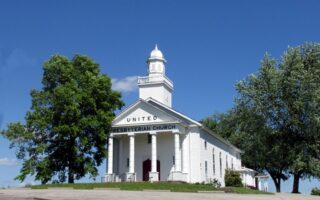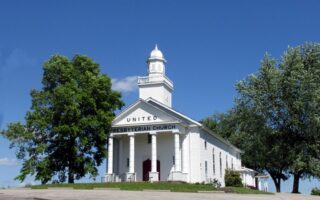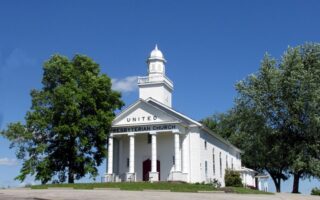Presbyterianism is a specific denomination within the broader Christian faith. While both Presbyterianism and Christianity share common beliefs and practices, Presbyterianism has distinct characteristics that set it apart from other Christian denominations.
Table of Contents
The History and Beliefs of the Presbyterian Church
The Presbyterian Church is a branch of Christianity that has its own unique history and set of beliefs. To understand how Presbyterian is different from Christian, it is important to delve into the origins and core principles of this particular denomination.
The Presbyterian Church traces its roots back to the Protestant Reformation in the 16th century. It was founded by John Calvin, a French theologian who sought to reform the Catholic Church. Calvin’s teachings emphasized the sovereignty of God and the authority of scripture. These ideas formed the basis of Presbyterian theology.
One of the key beliefs of the Presbyterian Church is the concept of predestination. This doctrine holds that God has already determined who will be saved and who will be damned. It is a controversial belief that sets Presbyterians apart from other Christian denominations. While many Christians believe in free will and the ability to choose salvation, Presbyterians believe that God’s will is absolute and cannot be changed.
Another distinctive feature of the Presbyterian Church is its form of church government. Unlike other Christian denominations that are led by bishops or a hierarchical structure, the Presbyterian Church is governed by a system of elders. These elders, known as presbyters, are elected by the congregation and serve as spiritual leaders and decision-makers within the church. This democratic approach to church governance is a defining characteristic of Presbyterianism.
Presbyterians also place a strong emphasis on education and intellectual inquiry. The Presbyterian Church has a long tradition of promoting education and scholarship. Many Presbyterian churches have their own schools and colleges, and the denomination has historically been involved in the establishment of universities. This commitment to education reflects the belief that faith and reason are not mutually exclusive, but rather complement each other.
In terms of worship, the Presbyterian Church follows a liturgical tradition. Services are typically structured and include elements such as prayers, hymns, scripture readings, and sermons. The sacraments of baptism and communion are also central to Presbyterian worship. However, the specific practices and rituals may vary among different Presbyterian congregations.
Despite these differences, it is important to note that Presbyterians are Christians. They believe in the divinity of Jesus Christ and the salvation offered through his death and resurrection. Like other Christians, they strive to live according to the teachings of Jesus and seek to spread the message of the gospel.
In conclusion, the Presbyterian Church is a distinct branch of Christianity with its own unique history and beliefs. It was founded by John Calvin during the Protestant Reformation and emphasizes the sovereignty of God, predestination, and democratic church governance. While there are differences between Presbyterianism and other Christian denominations, it is important to recognize that Presbyterians are Christians who share a common faith in Jesus Christ.
Key Differences Between Presbyterianism and Other Christian Denominations
Presbyterianism and Christianity are often used interchangeably, but they are not exactly the same thing. While Presbyterianism is a branch of Christianity, there are some key differences that set it apart from other Christian denominations. In this article, we will explore these differences and shed some light on what makes Presbyterianism unique.
One of the main differences between Presbyterianism and other Christian denominations is the way they are governed. Presbyterian churches are governed by a system of elders, known as a presbytery. These elders are elected by the congregation and are responsible for making decisions on behalf of the church. This system of governance is different from other Christian denominations, where decisions are often made by a single leader or a group of leaders.
Another difference lies in the way worship is conducted. Presbyterian worship services are known for their simplicity and reverence. The focus is on the Word of God, with sermons playing a central role in the service. Hymns and prayers are also an important part of Presbyterian worship, but they are not as elaborate or theatrical as in some other Christian denominations. The emphasis is on the spiritual experience and connecting with God, rather than on elaborate rituals or ceremonies.
Presbyterianism also places a strong emphasis on education and intellectual inquiry. The Presbyterian Church has a long history of valuing education and encouraging its members to seek knowledge and understanding. This is reflected in the emphasis on biblical study and theological education within the Presbyterian tradition. Many Presbyterian churches have their own schools or colleges, where members can deepen their understanding of the faith.
In terms of theology, Presbyterianism is known for its Calvinist roots. John Calvin, a 16th-century theologian, played a significant role in shaping Presbyterian theology. Calvinism emphasizes the sovereignty of God and the idea of predestination, which states that God has already determined who will be saved and who will not. This theological perspective sets Presbyterianism apart from other Christian denominations that may have different views on these topics.
Another key difference is the way sacraments are celebrated. In Presbyterianism, there are two sacraments: baptism and the Lord’s Supper (also known as communion). These sacraments are seen as symbolic acts that represent the grace of God and the believer’s response to that grace. The sacraments are important in Presbyterian worship and are often celebrated with reverence and solemnity.
Despite these differences, it is important to note that Presbyterianism is still a part of the broader Christian tradition. Presbyterians believe in the divinity of Jesus Christ and the importance of faith in salvation. They share many core beliefs with other Christian denominations, such as the belief in the Trinity and the authority of the Bible.
In conclusion, while Presbyterianism is a branch of Christianity, there are some key differences that set it apart from other Christian denominations. These differences include the system of governance, the style of worship, the emphasis on education, the theological perspective, and the celebration of sacraments. However, it is important to remember that despite these differences, Presbyterians are still Christians who share many core beliefs with other Christian denominations.
Presbyterian Worship Practices and Traditions
Presbyterian Worship Practices and Traditions
When it comes to worship practices and traditions, the Presbyterian Church has its own unique approach that sets it apart from other Christian denominations. While both Presbyterians and Christians share a common belief in Jesus Christ as their savior, there are distinct differences in how they worship and express their faith.
One of the key aspects of Presbyterian worship is the emphasis on the Word of God. Presbyterians believe in the authority of the Bible and its role as the ultimate guide for faith and practice. This is reflected in their worship services, where the reading and preaching of Scripture take center stage. Sermons are a vital part of Presbyterian worship, as they provide an opportunity for the congregation to engage with the Word and apply it to their lives.
Another important aspect of Presbyterian worship is the use of liturgy. Liturgy refers to the order and structure of the worship service, including prayers, hymns, and rituals. Presbyterians follow a set liturgical pattern that includes elements such as the Call to Worship, Confession of Sin, Assurance of Pardon, and the Lord’s Prayer. This structured approach helps to create a sense of reverence and unity among the congregation.
In addition to liturgy, music plays a significant role in Presbyterian worship. Hymns are an integral part of the service, with congregational singing being a cherished tradition. Presbyterians value the rich theological content found in hymns and see them as a way to express their faith and connect with God. Traditional hymns are often accompanied by organ music, which adds to the solemnity and beauty of the worship experience.
While Presbyterian worship is rooted in tradition, there is also room for flexibility and creativity. Many Presbyterian churches incorporate contemporary elements into their services, such as praise bands and modern worship songs. This blending of old and new allows for a diverse worship experience that appeals to people of all ages and backgrounds.
Another distinctive feature of Presbyterian worship is the sacraments. Presbyterians recognize two sacraments: baptism and the Lord’s Supper. Baptism is seen as a sign and seal of God’s covenant, symbolizing the believer’s identification with Christ and their inclusion in the community of faith. The Lord’s Supper, also known as Communion, is a commemoration of Christ’s sacrifice and a means of grace for the believer. These sacraments are celebrated regularly in Presbyterian worship services, providing a tangible expression of faith and a reminder of God’s presence.
Presbyterian worship is also characterized by a strong sense of community and participation. Congregational involvement is encouraged, with opportunities for members to lead prayers, read Scripture, and serve in various roles during the service. This active participation fosters a sense of ownership and belonging within the church, as well as a deeper connection with God and fellow believers.
In conclusion, Presbyterian worship practices and traditions set it apart from other Christian denominations. The emphasis on the Word of God, the use of liturgy, the importance of music, the celebration of sacraments, and the sense of community all contribute to a unique worship experience. While there may be variations among individual Presbyterian churches, these core elements remain consistent, providing a rich and meaningful expression of faith. Whether you are a Presbyterian or simply curious about their worship practices, attending a Presbyterian service can be a rewarding and enlightening experience.
Understanding the Role of Elders in the Presbyterian Church
Have you ever wondered what sets the Presbyterian Church apart from other Christian denominations? One key difference lies in the role of elders within the church. In the Presbyterian Church, elders play a vital role in the decision-making process and the overall governance of the church. Let’s take a closer look at the understanding of the role of elders in the Presbyterian Church and how it differs from other Christian denominations.
In the Presbyterian Church, elders are not just ordinary members of the congregation. They are chosen and ordained to serve as spiritual leaders and shepherds of the church. These individuals are elected by the congregation and are responsible for providing guidance, wisdom, and oversight to the church community. This is in contrast to other Christian denominations where the decision-making power often rests solely with the clergy or a select group of leaders.
The role of elders in the Presbyterian Church is rooted in the belief in the priesthood of all believers. This means that every member of the church has a role to play in the ministry and mission of the church. Elders are seen as representatives of the congregation, chosen to exercise leadership and make decisions on behalf of the entire community. They are called to be servant leaders, caring for the spiritual well-being of the congregation and ensuring that the church remains faithful to its mission.
One of the key responsibilities of elders in the Presbyterian Church is the oversight of the church’s spiritual life. They are tasked with ensuring that the Word of God is faithfully preached and taught, and that the sacraments are administered in accordance with the church’s beliefs and practices. Elders also provide pastoral care and support to the congregation, visiting the sick, praying for those in need, and offering guidance and counsel to individuals and families.
In addition to their spiritual duties, elders also have a role in the governance of the church. They participate in the decision-making process, helping to discern God’s will for the church and making important choices that impact the life of the congregation. This collaborative approach to leadership sets the Presbyterian Church apart from other Christian denominations, where decision-making power may be concentrated in the hands of a few individuals.
The role of elders in the Presbyterian Church is not one of power or authority, but rather one of service and humility. Elders are called to lead by example, demonstrating Christ-like love and compassion to the congregation and the wider community. They are encouraged to listen to the voices and concerns of the congregation, seeking to discern God’s will together.
In conclusion, the role of elders in the Presbyterian Church is a unique and important aspect of its identity. Unlike other Christian denominations, the Presbyterian Church values the participation and leadership of all its members, with elders playing a central role in the decision-making process and the overall governance of the church. Through their spiritual guidance, pastoral care, and collaborative leadership, elders help to shape the life and mission of the Presbyterian Church, ensuring that it remains faithful to its calling.
Conclusion
Presbyterianism is a specific denomination within Christianity, characterized by its form of church governance and theological beliefs. While Christianity is a broad term encompassing various denominations and beliefs, Presbyterianism is a specific branch of Christianity that follows a particular set of principles and practices.


